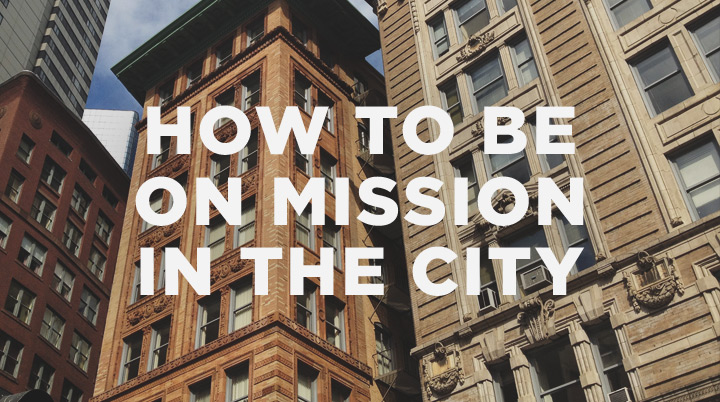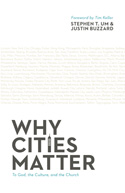Latest
-
Objections to the Christian Faith from the Unchurched and De-Churched
 Tue Dec 02, 2014
Tue Dec 02, 2014
by Resurgence -
Craig Groeschel: We Innovate for Jesus
 Tue Oct 14, 2014
Tue Oct 14, 2014
by Resurgence -
Mark Driscoll: Revelation
 Tue Oct 07, 2014
Tue Oct 07, 2014
by Resurgence -
RESURGENCE LEADERSHIP #034: JOHN PIPER, WHY I TRUST THE SCRIPTURES, PART 2
 Tue Sep 30, 2014
Tue Sep 30, 2014
by Resurgence -
Resurgence Leadership #033: John Piper, Why I Trust the Scriptures, Part 1
 Tue Sep 23, 2014
Tue Sep 23, 2014
by Resurgence

Archives
How to be on mission in the city

What does the future hold for cities? Stephen Um shares five tips for a faithful gospel mission.
Let’s consider just a sampling of the facts:
- 5.5 million people move into cities every month—that’s the equivalent of a new San Francisco Bay Area being created every 30 days. (UN-HABITAT)
- Right now, there are 23 megacities, with over 10 million citizens. By 2025, there will be 36 such cities. (UN)
- In 1900, only 14% of the world’s population lived in urban areas. The number was 30% in 1950. In 2011 the world became 51% urban. By 2050, the world will be nearly 70% urban. (PRB)
In short, all signs point to a very urban future.
What do you need to know in order to live on faithful gospel mission in this urban future? Here is what I believe are five necessities for faithful gospel mission in an urbanized world.
1. Get grounded in the gospel
A faithful presence of Jesus’ gospel in the city hinges on his gospel itself. There are great needs in your city, and there are many doing important work, but the gospel itself will be the unique contribution that you bring to your city.
Whether you find yourself working in finance, the arts, health care, vocational ministry, or some other field, your life in the city must be grounded in and driven by the gospel of grace. The gospel is the be-all, end-all of the Christian life in an urbanized world.
2. Learn your city’s story
Every city has a story, a story that tells the overarching belief system that drives how the city functions.
You can get to know your city’s story in the same way that you would come to learn one of you neighbor’s stories: Ask questions. Listen. Observe. Interact.
As you consider the history, values, dreams, fears, and ethos of your city, an overarching storyline will emerge. For example, the story of Boston is the pursuit of knowledge through education. The story of Silicon Valley is the pursuit of success through innovation. The story of Washington, D.C. is power through governance.
Get to know it so that you can understand the overarching belief system with which your neighbors are working.
3. Engage in the life of your city
Faithful gospel mission in an urbanized world is not something that you can do on paper. Much like exiled Israel, we are called to “seek the welfare of the city” in which God has placed us. We must “pray to the LORD on its behalf, for in its welfare you will find your welfare” (Jer. 29:7). In other words, we need to engage the life of our cities.
For exiled Israel, this included the basic cultural work of homebuilding, garden planting, harvesting, marrying, and childrearing (Jer. 29:5–6). Our cities must be places where we set down our roots and seek out relationships with our neighbors for the good of the city.
4. Discern your city’s idols
All cities are centers of worship, and urban dwellers are some of the most passionate worshipers on earth.
The issue is not worship; the issue is the false gods that steal our affection, devotion, and praise. It is important to ask questions like:
- “What is it that drives my neighbors’ lives?”
- “What is it that those who live in my city could not imagine living without?”
- “What, if it were taken away, would bring my city to its knees?”
Faithful gospel mission means that we must become keen at identifying the false gods to which our neighbors are attaching their hopes. Loving my neighbors is at least partly about helping them spot the lies they are believing that will leave them perpetually dissatisfied.
5. Retell your city’s story with the gospel
The gospel doesn’t destroy a city’s story, but brings completeness to it.
Once you have engaged your city and determined the nature of its idols, the key is to retell the story of the city in such a way that its idols are found to be wanting and its hopes are seen to be fulfilled in Christ alone.
If your city is built on knowledge, it must come to see the emptiness of its own knowledge in light of the folly of the cross of Christ, “who became to us wisdom from God” (1 Cor. 1:30). If your city is built on power, it must come to see the weakness of its own power in light of the all-powerful one who willingly gave himself up for our sakes, not counting equality with God something to be grasped (Phil. 2:6–11). When the inhabitants of a city turn from their idols to worship the God of the gospel, the city’s story finds its completeness.
There is much more to be said about faithful gospel mission in an urbanized world, but this much is clear: the world is moving to the city. The question that hangs in the air is, “How will Christians respond?”
Portions of this post are adapted from Why Cities Matter
